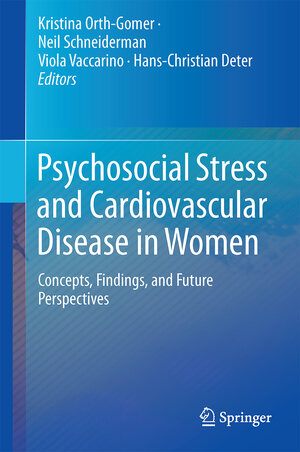
“The book Psychosocial Stress and Cardiovascular Disease in Women: Concepts, Findings, Future Perspectives presents a thorough overview of the research related to heart disease and women. … This book appears to be the only book dedicated to the subject of cardiovascular disease in women, and, therefore, it offers the most comprehensive view of the area. … book is a stellar contribution to work on cardiovascular health in women, and it would be a valuable resource for professionals in this field.” (Elaine A. Burke, PsycCRITIQUES, Vol. 60 (46), November, 2015)
Psychosocial Stress and Cardiovascular Disease in Women
Concepts, Findings, Future Perspectives
herausgegeben von Kristina Orth-Gomér, Neil Schneiderman, Viola Vaccarino und Hans-Christian DeterNot long ago, it was assumed that coronary heart disease mainly--or only--affected men. Now that CHD is recognized as a leading killer of women as well as men, numerous research studies have been made of its diverse presentations in women, causal factors, and possibilities for prevention and treatment.
The expert contributions to Psychosocial Stress and Cardiovascular Disease in Women span the results of this cross-disciplinary awareness. This progressive resource takes a three-dimensional approach to its subject, focusing on epidemiology and risk factors for heart disease in women, the psycho- and neurobiology of stress and coronary disease, and promising clinical interventions. Chapters identify and analyze multiple intersections of social, biological, and psychological factors in affecting women's heart health, from the social dimensions of depression to genetic/environmental interactions to the demands of balancing work and family. These wide-ranging findings will assist and motivate professionals in choosing and creating interventions, developing appropriate prevention strategies, and reducing gender-based disparities in health care. Among the topics covered:
- Enhancing women's heart health: a global perspective.
- Coronary heart disease in women: evolution of our knowledge.
- Gender observations on basic physiological stress mechanisms in men and women.
- Sleep as a means of recovery and restitution in women.
- LifeSkills training: benefiting both genders, for different reasons.
- Gender considerations in psychosocial-behavioral interventions for coronary heart disease.
In particular this book will be helpful for cardiologists and other clinicians who may ask themselves why patients do not seem to make rational choices. „Why do patients not follow the advice they are offered?“ is a common complaint. The role of psychosocial stress for patient compliance and adherence can be traced throughout the volume. It is emphasized in the chapters on psychosocial interventions along with other tangible and conceptual suggestions and experiences with psychosocial stress and life style change. Psychosocial Stress and Cardiovascular Disease in Women offers a deep practical level of understanding of this epidemic to help expand the work of health and clinical psychologists, sociologists, cardiologists, primary care physicians, and epidemiologists.




